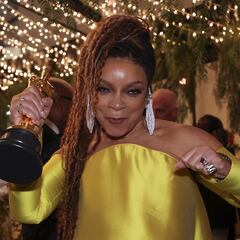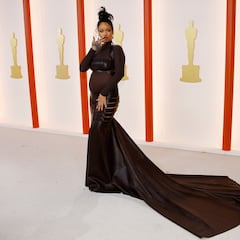Ruth E. Carter becomes the first Black woman to win two Oscars
Ruth E. Carter made history at the 95th Academy Awards ceremony

Costume designer Ruth E. Carter made Oscars history this Sunday when she became the first Black woman to win multiple Oscars throughout her career.
Carter won her second Oscar in the Best Costume Design category for her work on ‘Black Panther: Wakanda Forever’, which hit theaters on November 11, 2022. The film was the final installment of Marvel Studios’ Phase Four in the MCU.
The acclaimed costume designer bagged her previous Oscar in 2019, for her work on the first ‘Black Panther’ film. Her first win also made history, making Carter the first Black woman to win an Oscar for Best Costume Design in Oscars history.
Carter has dressed characters in notable films for the past thirty years, but her work on Black Panther afforded the costume designer recognition on the most prestigious stage in America. Her previous two Oscars nominations were for her work on Spike Lee’s film ‘Malcolm X’ (1992) and Steven Spielberg’s ‘Amistad’ (1997).
Ruth E. Carter delivers profound Academy Award acceptance speech
Carter’s acceptance speech made many viewers tear up this past Sunday when she accepted her Best Costume Design award. Carter revealed to audiences that her mother had passed away earlier that week at age 101.
“Thank you to the Academy for recognizing the superhero that is a Black woman,” Carter said in her heartfelt address.
She continued, “she endures, she loves, she overcomes, [and] she is every woman in this film. She is my mother. Chadwick, please take care of mom.”
Carter paid tribute to the titular actor of the Black Panther series, Chadwick Boseman, who passed away in 2020 after a four-year struggle with colon cancer.
Ruth E. Carter combines tech and tradition in her ‘Black Panther’ costuming
Carter made waves with her costume design for both Black Panther films. Her innovative conceptions combined traditional garment designs from a plethora of African nations and cultures with cutting edge futurism emblematic of the fictional Wakanda’s advanced tech.
“I thought this has got to be an important film, and it had to be something that was Afrofuturist,” the Oscar winner said in an interview with CNN.
Related stories
She continued, “I would have to represent images of beauty, forms of beauty, from the African tribal traditions so that African-Americans could understand it; so that (non-black) Americans could understand African-Americans better; so we could start erasing a homogenized version of Africa.”
Carter’s costume design is integral to the film itself, with the costuming reinforcing Wakanda as a nation that seamlessly maintains a symbiotic relationship between immense technological progress and the preservation of traditional cultures.


